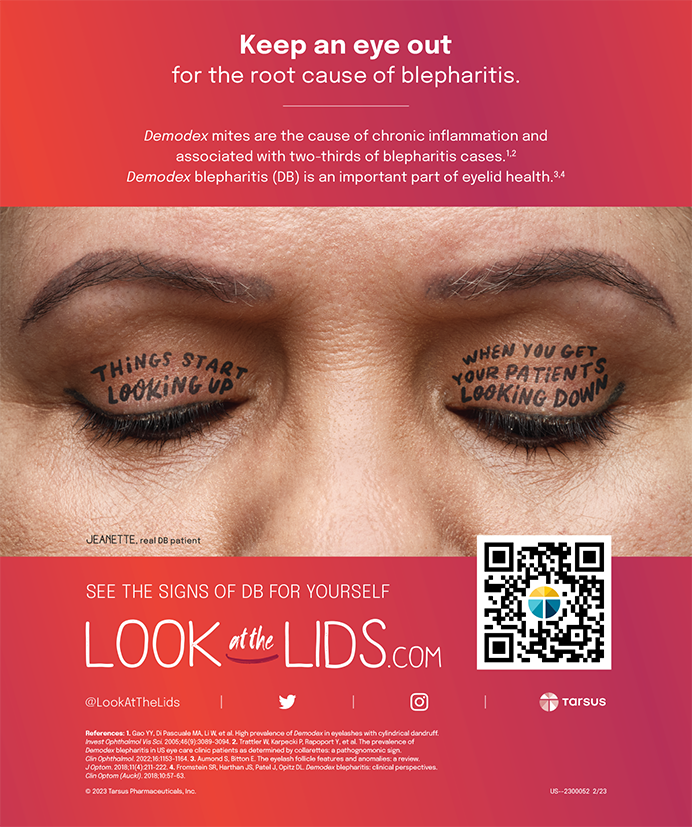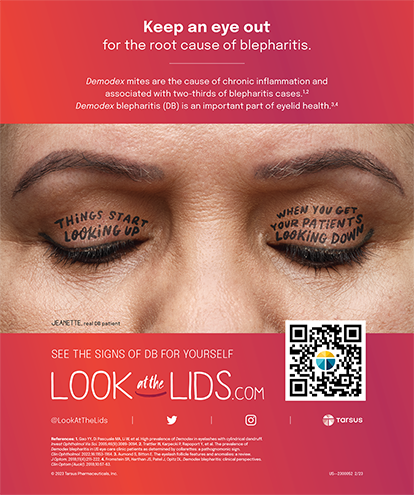I have a confession to make. I think the social networking phenomenon is invasive. I am astounded at the minutiae posted daily in the blogosphere. I believe online reviews and ratings often blur fact and opinion. As a result, until recently, I made liberal use of e-mail, search engines, and Web sites to take what I needed from the Internet. My consulting group works carefully to construct our practices' Web sites, optimize their appearance on search engines, and communicate warmly—but usually not electronically—with patients. Although I believe we have a well-managed, best-foot-forward approach to elective vision ophthalmology, I failed to notice a transition taking place.
According to the Pew Internet and American Life Project,1 people now using the Internet are not simply taking information away from it. Increasingly large numbers are giving and publishing their opinions and ideas as well. Unlike television, which commands our participation without allowing our input, the Internet permits us to be much more involved as co-creators of our online environment. I did not fully grasp the consumer-as-creator transition and how it relates to medical practices until recently. People are saying things to, for, and about your medical practice that you must hear, because thousands—sometimes even millions—of others online are already listening.
YOUR ONLINE REPUTATION
When was the last time you Googled yourself or your practice? According to Pew/Internet, 47 of Internet users have searched for themselves online, up from 22 in 2002, but only 3 of self-searchers say they do so regularly.2 When American adults were asked what sources of information they consulted for assistance in solving problems such as heath-related issues, however, 58 chose the Internet, higher than their reliance on professional advisors (53), friends and family members (45), and newspapers, magazines, or books (36). Of the group seeking information from the Internet, 94 felt they were successful in getting the information they sought.1 What are you doing to ensure that what they read about you is accurate?
When patients search for you or your practice, search engine listings are typically their first resource. If you are doing a good job of monitoring your practice's Web site but are not checking your listings on search engines, you may be missing both positive and negative associations with your name. I became acutely aware of this problem when one of the listings appearing under my name was for a LASIK-scare Web site. How could I be associated with such a site, I wondered? By following the link, I realized that the site's creators had read one of my articles emphasizing the importance of improving the office environment in elective vision surgery. I specifically wrote, "create a vision spa." The degree of vitriol directed toward me was substantial, and the twisting of my original intent profound. Nevertheless, I realized that comments from the podium, articles, or consumer-targeted communications reach a huge audience, members of which may comment on these remarks without the originator's consent.
HOW DO YOU RATE?
Online user reviews have been available for more than a decade. Amazon.com started the trend in 1995 by offering visitors to its Web site a chance to post reviews of books. This phenomenon has now extended to more than 24 physician-rating Web sites where patients, often anonymously, can share their opinions about everything from your surgical skill and bedside manner to how long they waited for an appointment. When I searched Google for "rate your doctor," I got 1.8 million results. The American Medical Association's president-elect, Nancy Nielsen, was quoted in US News and World Report3 as saying, "[Physician-rating] sites add nothing to the quality of patient-physician communication and understanding." Michelle Andrews, the author of the article, however, stated that doctors would benefit from using the sites to learn what patients think.
The trend toward more transparency in physician/patient encounters will not reverse. John Swapceinski, founder of RateMDs.com, says 75 of posters on his site want others to know how good their doctor is.3 I searched RateMDs for many of my physicians, and other high-profile cataract and LASIK surgeons, and overwhelmingly found the ratings to be either absent or positive. For one very accomplished surgeon, however, I found a posting that states, "left me blind in one eye." Should the physician ignore the rating or post a response? Can the identity of the patient be established so that the physician can attempt to follow up and resolve the problem?
There are a number of ways to monitor and respond (or not) to online ratings, but legal action is usually not the best course. Federal law asserts that the hosts of Web sites on which consumers post anonymous opinions are immune to charges of defamation,4 and the courts have been mixed in how they interpret the balance between the right of a speaker to converse freely and the right of a plaintiff to recover damages for defamation.5 Clearly, an important first step is an awareness of what is being said about you.
In my next column, I will describe how you can act to protect your online reputation and why you should participate in increasing the positive dialogue about ophthalmology online.
Kay Coulson is President of Elective Medical Marketing, which helps surgeons grow their elective vision service lines. She can be reached at kay@electivemed.com.


